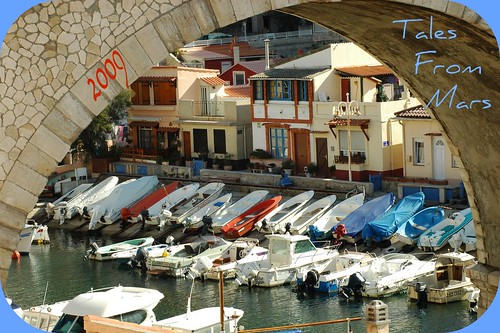Thursday, January 17, 2008
What You Got the Hump About?
So last night I asked my husband what "hump" was in French. (Don't ask why.) And I didn't mean "hump" as in a Quasimodo-like hump but hump as in "to hump," like what a dog might do to your leg at a dinner party. Here's what I found in Harrap's, a mammoth of a dictionary that I consult nearly every day.
être bossu: to have a hump
le plus difficile est passé maintenant: we're over the hump now
faire la tête, bouder: to have the hump, be sulking. (What????? To have the hump?)
pourquoi est-ce qu'il fait la tête?: what's he got the hump about? Say what!!
Needless to say, I burst out laughing at this one. Never ever have I heard the expression "What's he got the hump about?" and if someone has I'd be inclined to think he/she had grown up on a camel farm in North Dakota. I don't know if this is just bad translation or something that simply can't be translated -- a direct translation, which also wouldn't make any sense, is "why's he making the head?" -- but I can't stop laughing at the thought of saying this to someone in English. In looking for another word I landed on "couch-potato." If you ever want to talk about someone who's a real couch-potato go ahead and say it in French, "il est très télé." Right. He's really television that guy. A real big lazy television.
Then again, to poke fun at English, why potato and not turnip?
Monday, January 14, 2008
Uh...gross.

Every couple of months there's a city-wide advertising campaign to try and convince, remind, teach, and scold the Marseillais a thing or two about a particularly odious French problem: caca. More specifically, dog caca. This is the latest ad. I'm not sure it's effective but it certainly catches one's attention...hopefully not during lunch hour!
Friday, January 11, 2008
Not Sold on Les Soldes
Let it be known I don't really like shopping. Occassionally I'm inspired to hit the racks but usually I shop when I need something. Like boots. Boots are everywhere in France. No matter your age almost every female, even the least fashion-conscious, owns a pair of boots. The realization that I didn't have a pair of flat-soled, stylish yet comfortable boots irked me; all of a sudden my wardrobe was conspiring against me to make me feel even more un-French. So a few months ago I began the hunt for a pair of boots. But there were so many styles and colors, let alone stores, that I froze, indecisive and uncertain, when confronted with a decent or above-average pair. It was either the wrong height (ie the type of boot that looks like it walked off the set of "The Three Musketeers"), the heel was either too pointy or tall, the color wasn't just right, or it was too expensive. Or even too cheap, which meant it would fall apart in a week's time with all the walking I do. Then I remembered les soldes -- the sales -- and decided to wait a little longer to find the perfect boot. By law, for nearly two weeks, all stores must offer their latest collections (summer for the July sales and winter for the January sales) at incredible discounts. I recently learned that the reason stores don't have sales throughout the year (as is the case in the U.S. and most other parts of the world) is to prevent the bigger names, like Galeries Lafayette, from putting the smaller businesses out of business. Such is the theory of a socialist system. I see the point, but I find it somewhat protectionist. Of course, laws are needed and do exist to protect small businesses but enacting a law that discourages and prevents owners and consumers from doing what they do best (selling and buying) when they want to, would never happen in the U.S. Perhaps that's because we're such a money-driven society...In any case, the days preceding the sales are buzzing with anticipation. The racks overflow, colored tags appear next to the original price tag (although you don't find out its equivalent discount price until the first day of the sale), posters go up on storefront windows (PRIX CHOC, LIQUIDATION TOTALE, SOLDES! SOLDES!), and, most noticeably, tons of women are to be seen carousing the racks -- but not buying anything. They're scouting things out, misplacing and hiding items, trying to convince the salesperson to put things aside or to give them the discount in advance, both of which are not allowed. I even saw entire sections of stores being cordoned off to seperate the non-sale items from the sale ones and bins full of purses being saran-wrapped to prevent impatient fingers from doing all or any of the above. There's quite a bit of preparation involved. And so guess what this self-confessed non-shopper did on the first day of the sales? Woke up at 7 am, took the metro to the center, and hit the stores by 8. I was determined to get those boots I had seen the day before. (Yes, I confess, I followed the advice of one of Marc's female colleagues and did a pre-shopping.) I knew things went fast and that my size, 38, would also go by fast. Every woman on the metro was potential competition; I laughed at myself, getting hyped up for a stupid sale, but it was also exciting. I wanted to be one of the first. I wanted to get that pull with the scoop neck because, dammit, there were only 3 left and of those 3 only 2 mediums! In the end, I got the boots and the pull. Yet it was so anti-climatic and I felt like such a...consumer. I went to a few other stores but nothing caught me eye. Nothing on sale was that great, none of the discounts that amazing (although I'm sure in some stores incredible deals can be had), and I never witnessed any women fighting or playing tug-of-war with some stupid clothing, as I've heard sometimes happens. All in all, les soldes was rather disappointing. Maybe it depends on the year, or on the enthusiasm of the shopper, but I can't really complain because I finally have my first pair of French boots.
Tuesday, January 8, 2008
Verlan: Word Play for Les Francais
At some point I realized that if I were going to truly learn French I had to drop the negative, smarmy, and holier-than-thou attitude. On particularly tough, depressing days I take out my frustrations on French culture and language. I poke fun at its hoity-toity rhythms, lambaste its delicate pronunciations, decry its lip-numbing (literally) formations and self-indulgent flowery-isms (who needs poetry in English when you have the suffix –ism?), and, most irritatingly, its play on words or jeux de mots. The French LOVE word play. My husband Marc has always told me about this, a phenomenon that had crossed the Atlantic and become an integral part of Quebecois culture as well. Word play isn’t just for the average cornball. In France it’s considered intellectual, as common as an octogenarian reading a bande desinée or comic book, and funny. Much of French humor is tied to word play because 1) there are so many words that sound alike and 2) so many of those same words that contain several, extremely unrelated meanings. The possibilities are endless. And so I shouldn’t have been surprised to learn about Verlan. Verlan is a language within a language. I can’t help but think of Ebonics as the near-perfect analogy. Both originated in the suburbs (meaning outlying city areas as opposed to strictly ghettoes), both were propagated by the hip hop community, and both have become accepted – to a certain degree – in every day life and interactions. Verlan began in Paris in the 1930s, gained momentum in the 70s and then saw an explosion in the 90s when French rap began to take off and reach a wider audience. (Here’s the departing point in my comparison, as Ebonics is generally used by the African-American population and Verlan is used by the populace at large.) Now Verlan is fashionable – it is a verb, verlaniser, much like “google” – although some already consider it ringard (corny, old-fashioned) and even d’une mauvaise manière (of a poor manner). Each to his own. But Verlan is a curiously interesting function of modern language-users; we continually attempt to make language less complex and more accessible by reducing syllables, dropping and/or rearranging letters, and inverting entire words. I find the opposite to be true, and it makes me wonder, somewhat nervously, what language(s) will be like 100 years from now, even earlier…which brings to mind David Mitchell’s “Cloud Atlas,” when in a futuristic world brand names become verbs and nouns. Nonetheless, one of the first mot verlanisé that I came across – without knowing it at the time – was keuf. Keuf means flic, or “cop,” in French. And keuf is flic, à la verlan. I mean, can’t you tell?! Here’s how that one works: keuf (keu-fli) = "flic" (fli-keu). In a way it works like Pig Latin: by dropping the final consonant sound “c” (as in “cut”) and adding the vowel sound –eu, the word thereby loses its original vowel sound to become “keu.” Add the “f” and voila!, you have the verlanised word keuf. But this is only what generally happens with a monosyllabic word. The rules are different for words of two syllables (apparently the simplest form) and for those with three or more. It must be known, however, that Verlan is intended to be a personalized language so although there are some “rules” none are set in stone. Here are a few more examples just to rattle your brain a bit:
zarbi = "bizarre"
zyva = "vas-y" (go ahead)
Moi → ouam
Toi → ouat
Méchant → chanmé (mean)
Gentil → tigen (nice)
Métro → tromé ou trom
Voiture → turvoi (car)
So far, les mots verlanisés haven’t held much appeal for me, perhaps because I’m still plowing through vernacular French. Then again, if and when the time comes that I do use Verlan I think it’ll be a huge sign that I’ve become more French than I would have ever imagined…et ca sera zarbi!
Subscribe to:
Posts (Atom)







